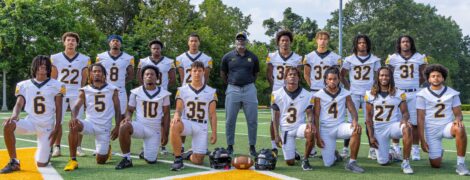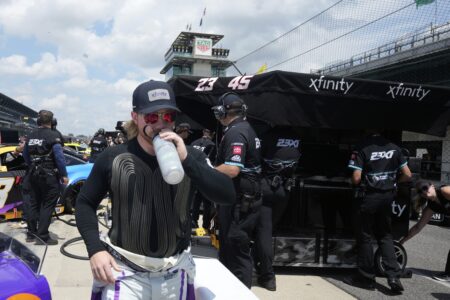Wren Baker Wants Best For WVU When It Comes To Scheduling, College Football Playoff Expansion
The athletic director of an institution has a couple of jobs, and a lot more in this new era of college athletics with revenue-sharing, NIL and the ever-changing conferences. If you go down to the high school level, a big part of the athletic director’s is handling the schedule. It’s the same way up at the collegiate level, too.
Thursday, the SEC released a new scheduling format for football, which included nine conference games, aligning with the Big Ten and Big 12. However, if you dug deeper into the press release, it states, “SEC teams are required to schedule at least one additional high quality non-conference from the Atlantic Coast, Big Ten or Big 12 conferences or Notre Dame each season.”
For those involved and in the know of West Virginia football, that’ll perk up some ears. The next two years, WVU has a home-and-home series against Alabama and a neutral site game against Tennessee in 2028. Would WVU be classified as a “high quality” non-conference opponent for those SEC teams? That’s the headline that surfaced over social media Thursday afternoon.
WVU athletic director Wren Baker quickly responded to the question at his annual preseason press conference Friday morning.
“I think we’ll know more in the next few days, but that announcement did not surprise me,” Baker said. “We’ve had multiple conversations over the spring and summer with a lot of different opponents, planning for the future. We’ll certainly circle up to see where we’re at. We don’t want any instability in our non-conference schedule, so I think it would be really important for us to try to solidify that sooner rather than later.”
Baker’s uncertain if Alabama would back out of the series, and if they do, it’d come with a hefty price tag for the Crimson Tide. Baker wants to make sure WVU knows sooner rather than later, though.
A possible replacement could be the Backyard Brawl between Pitt and WVU, which had it’s future in question over the summer. After 2025, the rivalry won’t appear again until Sept. 8, 2029, 1,456 days for those counting. Pitt’s head coach, Pat Narduzzi, commented on the future of the rivalry during ACC Media Days.
“If you guys have any power to see if we can get them in the next three years, we are willing to make some movements in our schedule and try to get that done,” Narduzzi said. “I would love to play them every year.”
Baker said he actually contacted Pitt athletic director Allen Greene about making the series happen after 2025 before Narduzzi took the podium. There have been talks.
When Baker makes the schedule, there are a lot of things to consider. The first thing on his mind is if it sets up WVU to help make the College Football Playoff, which he said is the “end goal.”
Then, there’s the financial aspect of whether the game would create interest and sell tickets. The game needs to bring people to Morgantown, so they can stay or come back another time to experience what the town has to offer, since the town and economy rely on the football team. That’s part of the reason Baker made the change at head coach.
“We’re weighing all those factors,” Baker said. “I’ll just say that we have spent hours and hours and hours analyzing scheduling opportunities. I think we have a pretty executable plan, no matter what happens in the next few days, and we’ll be able to execute pretty quickly.”
Then why does WVU schedule neutral site games, like the one in Charlotte against Tennessee? Baker has hotmaps of where fans are, and Atlanta and the surrounding area were one of them. Baker has been approached to play an international game, but he’s declined.
“It just hasn’t made sense,” Baker said. “We haven’t had the right one, right opportunity, yet. If it were a game that we thought really helped our brand, really, really allowed us to build some momentum, that’s something that we might consider.”
When it comes to regional rivalries, Baker knows those are usually the top priority. If Baker were allowed freedom, and there were still only eight conference games, he’d want an internal series with Pitt and Virginia Tech.
“That would be great,” Baker said. “I think in southern West Virginia, there are a lot of people there that probably see Virginia Tech just as much, if not more, of a rival as Pitt.”
The other scheduling Baker has a little say in is the College Football Playoff format. The CFP format has been the talk of the offseason and the basis of why the SEC changed its schedule.
There were original talks of a 5-plus-11 model, which the Big 12 supports, the Big Ten original model of four automatic qualifiers each for the Big Ten and SEC, then two for the Big 12 and ACC each, and then the most recent Big Ten model of potentially 24-28 teams.
Baker, as a Big 12 AD, supports the 5-plus-11 model. However, he’s not opposed to adding even more teams as long as it doesn’t impact the health of the student athletes and the automatic qualifiers are “equitable.”
“I’m open to any discussion that makes sense,” Baker said. “But I also believe you earn it on the field.”
It’s not easy building a schedule. There are so many college football teams to match up against, financial aspects and conference requirements when deciding what a schedule will look like. It’s hard to please everyone. When weighing the options and deciding between the different factors, Baker goes back to whether it’ll make the team successful. That’s most important.
Scheduling is just part of Baker’s job. He’s got a lot of other things to deal with, but that’s why he gets paid the big bucks.
“I think you’re looking at all of those things and knowing that there isn’t a perfect schedule, right?” Baker said. “You’re not going to build one that everybody’s like, ‘Oh, this is the perfect schedule.’ You’re trying to build a schedule that checks the most boxes you can check, understanding that the biggest box is probably that it allows your team to be successful.”




